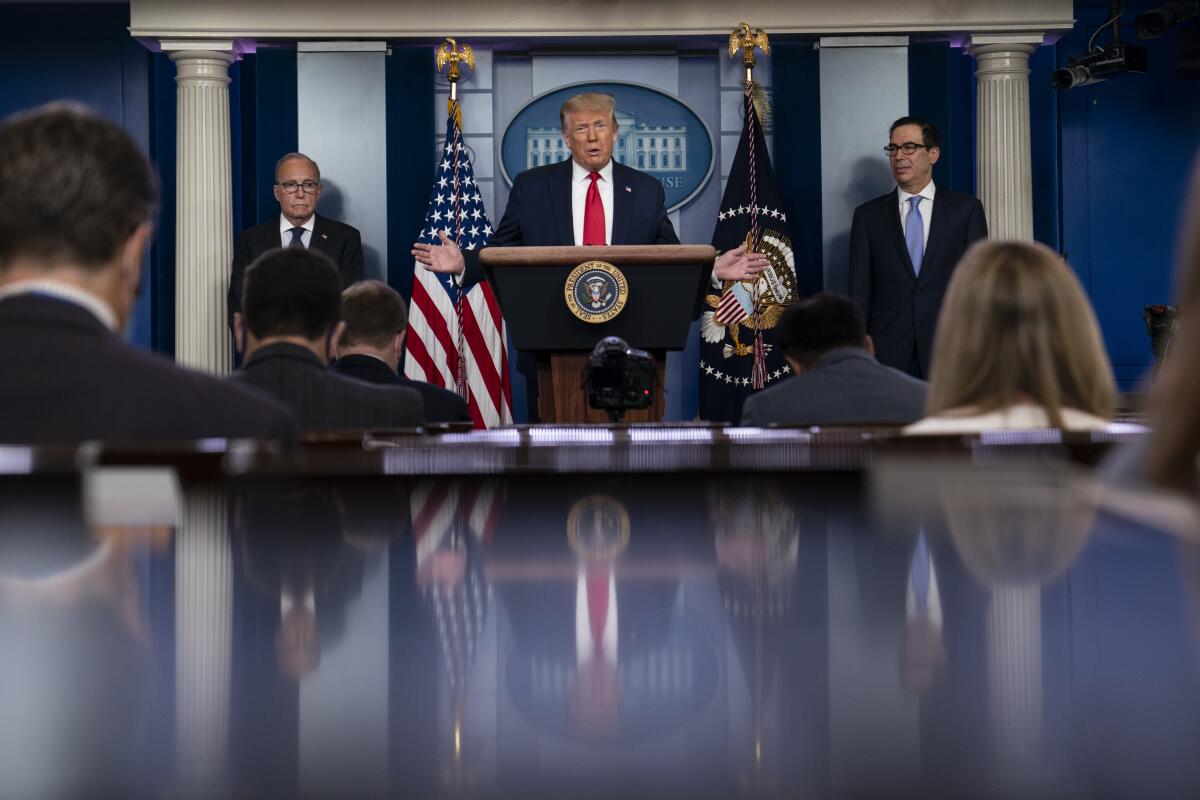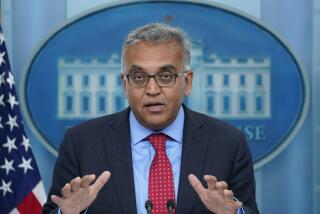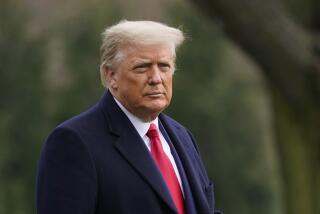Trump aides struggle to defend his pandemic relief orders as U.S. cases reach 5 million

- Share via
WASHINGTON — As the United States surpassed 5 million confirmed coronavirus cases, President Trump’s senior aides on Sunday defended his handling of intertwined economic and public health crises, declaring that Democrats would bear the blame for millions of Americans’ financial distress if lawmakers challenged Trump’s controversial new directives on pandemic relief.
House Speaker Nancy Pelosi (D-San Francisco) denounced the orders unveiled by Trump on Saturday at his New Jersey golf resort as “meager, weak and unconstitutional.” In multiple interviews on Sunday’s news talk shows, she did not say whether Democrats would go to court to try to overturn the measures but urged a return to negotiations on the $3-trillion-plus relief package passed by the House in May.
“We have to reach an agreement,” Pelosi said on “Fox News Sunday.”
The Republican plan, much smaller at $1 trillion, rejects many of the key House provisions, including aid to states whose budgets have been ravaged by the pandemic and a continuation of a $600-a-week enhanced jobless benefit. Talks between the two sides broke down last week.
Pelosi and other senior Democrats suggested that the president’s attempts to unilaterally chart spending and tax policy — normally the purview of Congress — might well fall apart on their own, as top Trump lieutenants struggled to explain the envisioned mechanisms for carrying out the president’s wishes, at times contradicting one another.
Larry Kudlow, director of the White House National Economic Council, acknowledged that states had not committed to making up a $100 share of the $400 enhanced unemployment benefit the president announced, as Trump suggested they would.
“We will probably find that out today and tomorrow as we make our canvass — we have been in touch with them,” he said on CNN’s “State of the Union.”
Treasury Secretary Steven Mnuchin, on “Fox News Sunday,” said states would be able to move immediately to set up new unemployment insurance provisions, but Kudlow indicated the timing was unclear.
Separately, Kudlow equivocated when pressed in the CNN interview as to whether Trump’s order would actually freeze evictions, as the president said it would. Democrats say the actual order only calls for a review of the issue.
“We’re setting up a process, a mechanism, OK?” he said. “I can’t predict the future altogether.”
One of the thornier questions for Trump’s surrogates was the future of Social Security and Medicare, which are funded by payroll taxes that the president announced he was deferring until year’s end for Americans earning less than $100,000 a year. Trump also said that if reelected, he would seek to abolish the payroll tax altogether.
Asked on CNN how to reconcile that with Trump’s promises to protect Social Security and Medicare, Kudlow denied that Trump intended to eliminate the payroll tax if he were to win in November.
“I — I think he was referring — doing away with it, I believe he was referring to doing away with the payback of the deferral” of payroll taxes, he said.
“That is not what the president said at all,” host Dana Bash rejoined.
Mnuchin, on Fox, said lost revenue from payroll taxes would not imperil Social Security and Medicare because the money would be made up from elsewhere.
White House trade advisor Peter Navarro, appearing on NBC’s “Meet the Press,” brushed aside questions raised by Democrats and even some Republicans about the legality of the president’s directives. Sen. Ben Sasse (R-Neb.) called the executive actions “unconstitutional slop.”
“I’m confident that every single one of these orders, which cleared through the Office of Legal Counsel, will stand up,” Navarro said.
Administration officials sought again Sunday to spotlight what they described as positive news on the pandemic front in the U.S. — which leads the world in officially reported coronavirus deaths with more than 160,000.
“We are working 24/7 on these things,” Navarro said in his NBC interview. “And we’ve made great progress on therapeutics, on vaccine development. The president is going to probably be able to get one or more vaccines by the end of the year.”
Trump’s national security advisor, Robert C. O’Brien, who said he had recovered from a bout with the coronavirus, described the state of testing in the United States as a “miracle.”
“There’s no country in the world that comes close to what America is doing on testing,” O’Brien said on CBS’ “Face the Nation.”
But experts from outside the administration cast the fight against the coronavirus in a far bleaker light.
Dr. Scott Gottlieb, a former Food and Drug Administration commissioner, predicted on CBS that, by the end of the year, U.S. deaths would be somewhere between 200,000 and 300,000.
Dr. Tom Inglesby, the director of the Bloomberg School of Public Health at Johns Hopkins University, said the length of time it can take to obtain diagnostic test results has been a huge impediment to quelling outbreaks.
“It’s unacceptable for the country to have testing come back a week or even two weeks later,” he said on NBC. “It’s not useful at that point.”
Pelosi, in her Fox interview, described the contagion as “moving like a freight train.” On CNN, she said the stalemate over pandemic relief measures was rooted in Republicans’ failing from the beginning to understand “the gravity of the situation that we are in” with the coronavirus.
“They have ignored that,” she said. “The problem has grown. And it has become an enormous economic problem.”
More to Read
Get the L.A. Times Politics newsletter
Deeply reported insights into legislation, politics and policy from Sacramento, Washington and beyond. In your inbox twice per week.
You may occasionally receive promotional content from the Los Angeles Times.










